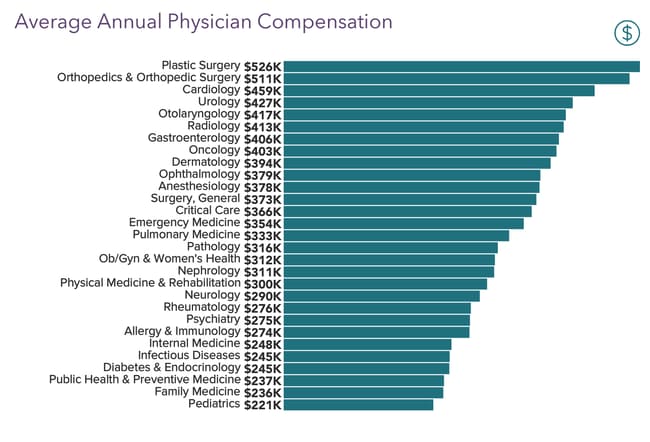
We all know that doctors are consistently ranked as one of the highest paid professions in the country. But we also know that becoming a doctor isn’t easy. It takes a long time before doctors start earning that high salary. Exactly how long? Keep reading to find out.
All doctors start getting paid during training in residency. However, after residency is when doctors start making their actual salaries. With the average medical resident starting training at age 28 and most residencies lasting 3-5 years, most doctors will start making their first attending level paycheck between ages 31 and 33.
Why is that important? Most individuals are already well established in their careers by their early 30s when doctors are just starting out. And that has major financial implications.
Can doctors catch up? Is being a physician worth it? Let’s discuss
Residency Salary vs The First Attending Paycheck
First I’d like to talk about the difference between residency salaries and attending salaries. For those who don’t know, after medical students graduate they go on to become residents, or doctors in training. It’s not until after residency that they become full fledged attending physicians.
Yes, resident physicians do get paid (unlike medical students who, financially speaking, only accumulate debt). And yes, making that first residency paycheck is pretty dang sweet. I remember mine being a little over $3,000. But this pales in comparison to the first attending level paycheck.
Compared to residents, who make around $50k per year, attending physicians make anywhere from $200k to over $500,000 per year, depending on what specialty they’re in. That’s anywhere from 4x to 10x their residency salaries.
So while yes, residents do get paid, resident salaries are not the salaries you see online when you look up the highest paid professions and find doctor salaries. These real doctor salaries don’t start until after residency, when most physicians are just getting into their 30s.
Physician Salaries By Specialty
Now that we know that by physician or doctor salaries, we really mean attending level salaries, let’s take a close look at what exactly those salaries are before moving on.
It’s important to know that doctor isn’t a catch all term. While every doctor graduating medical school has the same degree, residency turns those doctors into specialists. And in financial terms, there’s a big difference between the specialties. Let’s take a look.
Probably the best resource for discovering physician’s salaries by specialty is the annual Medscape Physician Compensation Report, seen below:
There’s a wide range of “doctor salaries” depending on what kind of doctor you become. You can see that a family medicine doctor makes around $236,000 while a cardiologist makes $459,000.
Can Doctors Catch Up?
Now we know the when and the how much. Doctors graduate medical school on average at age 28, complete a 3-5 year residency with or without an additional fellowship, and they end up making anywhere from $221,000 to $526,000 per year. Around the time they’re age 31 to age 33.
But despite their high salaries, doctors might still end up behind their non-physician peers financially speaking. That’s because of two powerful financial factors: Time and Compound Interest.
Compound interest is your money’s ability to make interest on itself and grow exponentially. And it gets more and more powerful over time. Let me explain with an example:
Take Person A who invested $100,000 at age 20. Without investing a single extra dollar, by the time they retire at age 65, they’ll have a total account value of almost $3.2 million dollars (assuming 8% annual interest). Thats a multiple of 32 times their initial investment!
Now let’s look at Person B who invested the same amount and earned the same amount of interest, but started at age 31. Doing the same exercise, person B ends up with just under $1.4 million dollars in their account. Not bad, but only 14 times their initial investment. Significantly less compared to person A.
Just about everything in that example was the same for Person A and Person B. Everything except time. Compared to Person B, Person A had 11 more years to grow their money with the power of compound interest. And they ended with almost twice as much money in retirement as person B.
All this means that the power of your invested dollars decreases the less time you allow it to grow.
So would you rather have $100,000 invested at age 20 or $100,000 invested at age 31?
What about $200,000 at age 31? Or $300,000?
What if it took an extra negative of $200,000 in student loan debt to get you there?
This is the financial situation for most physicians.
Do doctors make a lot of money? Yes. And they can catch up to their financially savvy peers over time.
But it’s easier to grow more money from a lot less money the younger you start investing.
Is Being A Doctor Worth It?
Let me start by saying there’s a lot more to being a doctor than just making money. There’s the joy of taking care of patients. Passion for the work itself. And if being a doctor is something you’re passionate about, I’d never tell you it isn’t worth it.
But what about purely financially? I’m talking to the college kid searching on google for the highest paying jobs and finding “Doctor”.
They’ll see the high salaries, but now they can see that doctors lose some of the power of investing through time and compound interest.
Is being a doctor still worth it financially?
Let me put it this way:
Is being a doctor the best way to make money?
When I was a medical student, I heard the same story over and over from a number of my attending physicians. “Don’t do this for the money”, they’d say. Or “I should have been an investment banker like my friend so and so”.
These docs went into medicine thinking it was the highest paying job, the best way to make money.
But it’s not.
Being a doctor is a great way to make a high salary. To work decent hours, get good benefits, and provide for your family. But is is the best way to make money? No.
The best way to make money is to invest money with compound interest over time. Or to build a scaleable business.
So if you want to be a doctor to make the most money, I’m sorry. You might actually be better off becoming an investment banker. Or maybe nowadays a youtuber, tiktoker, or twitch streamer.
Can doctors become millionaires?
If your financial goal isn’t just to make the most money possible, but instead to become a millionaire, being a doctor can absolutely get you there.
The road to becoming a physician millionaire is well traveled and entirely possible. All it requires is taking a little control of your finances and taking advantage of those powers of investing.
Ignoring student loans (which we know isn’t true for most physicians), even the lowest paid doctor could save and invest just 20% of their income and become a millionaire by time they’re 45*.
Adding in student loans would increase that time line, but still would make it a straightforward path for any doctor with good control over their finances to become a millionaire by the time they retire.
Will doctors make more than non-doctors?
What if you’re looking at becoming a doctor because of the salaries when there’s something else you would much rather do? Should you be a doctor just for the money?
Depending on your other career choice, I’d probably say no.
Even though doctors make high salaries, with the right financial decisions you could not be a doctor and still come out ahead.
If you still don’t believe me, I compared the financial net worth of a doctor and a software engineer in a previous post. If you want to read the full analysis, you can find it here.
And we haven’t even talked about the other, non financial sacrifices involved in becoming a doctor.
So no, doctor’s don’t necessarily make more money than non-doctors. And if there’s something else you’d rather do, or you don’t like the idea of being a doctor, you can still become financially successful.
But Aren’t all doctors rich?
What about this idea of the rich doctor? I thought doctors were supposed to be rich. Driving expensive cars, wearing fancy clothes. The whole nine yards, right?
Well, keep reading the average doctor blog and you’ll see behind this myth of the “Rich Doctor”.
The truth is most doctors are regular people just like you and I. People worried about child care, student loan debt, and skyrocketing real estate costs.
Of course there are doctors out there who make an effort to look rich, but those doctors are not the norm.
Conclusion
So when do doctors finally start making money?
Usually around age 31 to 35.
But that’s not all there is to it.
*assumes $44,000 invest at 8% interest compounded annually

